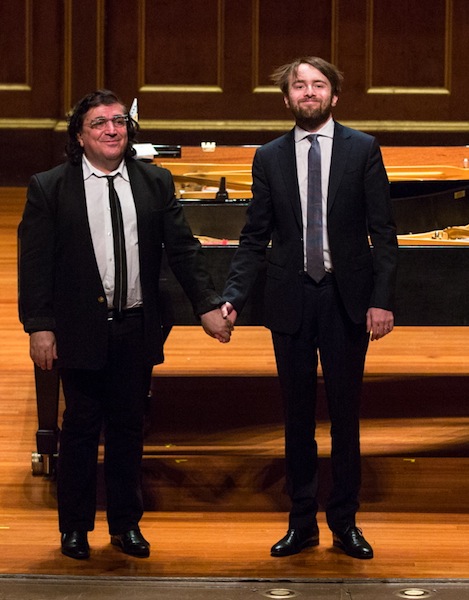Trifonov and Babayan bring depth and fireworks to two-piano program

Pianists Daniil Trifonov and Sergei Babayan performed Saturday night at Jordan Hall for the Celebrity Series. Photo: Robert Torres
No sooner had one Nor’easter blown out to sea than a new musical one, in the form of pianists Daniil Trifonov and Sergei Babayan, stormed in to Boston’s Jordan Hall, courtesy of the Celebrity Series, on Saturday night.
Trifonov is the great keyboard artist of his generation. A pianist of flawless technical skill, he is an even finer musician: thoughtful, probing, deeply communicative. Babayan was his teacher at the Cleveland Institute of Music and is a brilliant pianist in his own right. On Saturday, they made an ideal duo, playing with terrific consistency of articulation and interpretive feeling. Indeed, so tightly synched was their ensemble that, for much of the evening, the music’s four lines sounded as though they were being executed by a single pianist.
Their program began relatively quietly with Schumann’s Andante and Variations in B-flat Major, op. 46. The 1842 score (originally for two pianos, two cellos, and horn) is an often-melancholy work, though interspersed with more than a few spirited sections. Trifonov and Babayan dispatched the latter with rounded warmth and a good deal of energy, but it was Schumann’s dreamy, introspective writing that drew out their finest playing, both songful and golden-toned.
Arvo Pärt’s Pari intervallo (“Equal Interval”) followed. A spare, hypnotic composition from 1976, it represents Pärt’s uncluttered, post-serial musical language. The duo gave it an appropriately delicate reading, marked by even attacks and a keen attention to dynamics.
In Mozart’s Sonata in D Major, K. 448, a few fleeting spots of blurriness aside, Trifonov and Babayan’s interpretation of the piece brimmed with personality and wit, especially in the outer movements. The canons and antiphonal effects of the first section were texturally pristine, the Haydn-esque whimsy of the finale realized with charm. In between came a gorgeous account of the slow movement, whose featherweight articulations were perfectly matched between the players.
Throughout, the music’s many runs were executed with glittering facility and the duo’s focus strongly followed the score’s melodic line, which was always at the forefront of their reading.
After intermission came the night’s fireworks.
The entirety of the concert’s second half was devoted to both of Rachmaninoff’s two-piano Suites. Written, respectively, in 1893 and 1901, they are marvelous pieces: sweeping, tuneful, dramatic, virtuosic. In other words, they’re bread and butter for Trifonov and Babayan, and, on Saturday, the two delivered the goods.
Their performance of the First Suite offered, in its opening “Barcarolle,” playing of exquisite warmth and sweeping lyricism. In the second, “Oh Night, Oh Love,” the keyboardists articulated the movement’s dense rhythmic layers with savvy and imbued its main subject with robust pathos. The third movement, “Tears,” glowed, while the chiming bells and chorale of the closing “Easter” were thunderously etched.
In the Second Suite, the pair delivered a frenzied reading of the march-like “Introduction” that was bursting with vigor. The first section of the “Waltz” was taken at lightening speed, though things slowed down enough for the reflective second theme to sing with plenty of soul.
Trifonov played the opening melody of the “Romance” tenderly, which contrasted nicely with the demonic vigor that he and Babayan applied to the closing “Tarantella.” Theirs was a ferocious dance of death that began at a blistering tempo, somehow got faster, and finally blazed right off the edge into the abyss, breathtakingly wild but completely controlled at the same time.
Called back for multiple bows, the duo rewarded Saturday’s crowd not with a lullaby but with Victor Babin’s athletic arrangement of the “Dance of the Tumblers” from Nikolai Rimsky-Korsakov’s The Snow Maiden. Like the “Tarantella,” their exuberant performance of it, with volleyed melodies and motives flying back and forth between the grands on the Jordan stage was dazzling.
The next classical event sponsored by the Celebrity Series will feature violinist Benjamin Beilman and pianist Orion Weiss in music by Beethoven, Bartók, and Frederic Rzewski 8 p.m. March 7 at Longy’s Pickman Hall. www.celebrityseries.org; 617-482-6661.
Posted in Performances